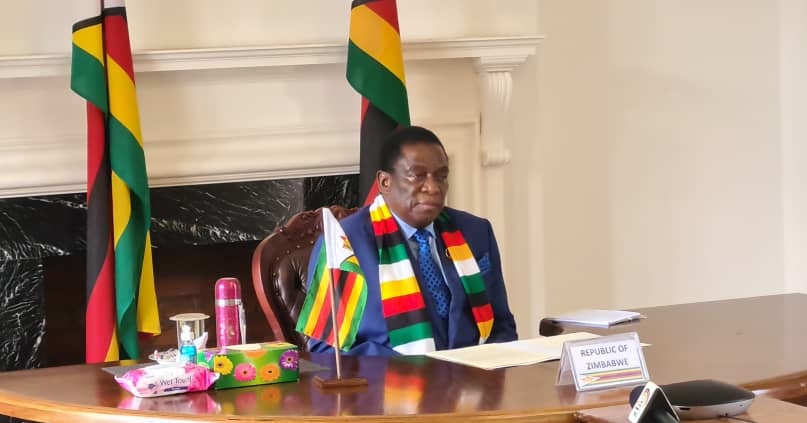By Staff Writer
President Emmerson Mnangagwa has called on Zimbabwe and Africa to lace up its discourse around investment and partnerships towards economic reconstruction, in order to be able to achieve the African Union’s Agenda 2063 and realisation of the ‘Africa we want.’
Speaking during the Africa Reconstruction Global Summit held virtually this Tuesday, President Mnangagwa said the focus of the summit, hosted by the World Economic Congress was in tandem with Zimbabwe’s drive of rising above its challenges.
“The theme of this conference, ‘Collaborating towards Economic Reconstruction of Zimbabwe and Africa’ is most opportune. The focus of the Summit is also in tandem with my country’s fortitude to quickly rebound following deleterious effects of colonialism and economic sanctions,” he said.
He went on to assure the world that Zimbabwe was capable of emerging from the Covid-19 era, with an industrialised and modern society which fully participated in the global economy.
Marketing the various economic opportunities in the country, the President highlighted the Zimbabwe Investment Development Agency (ZIDA), National Development Strategy 1 and vast opportunities in agriculture, mining, and manufacturing as vehicles for promoting an appropriate and competitive investment environment towards the reconstruction of the country.
In Agriculture, he said that the Agriculture and Food Systems Transformation Strategy, being implemented by Government had attendant vast opportunities. “These are in horticulture, agro-processing, development of rural industry systems, irrigation development and agriculture mechanisation. Africa is ready to feed the world and Zimbabwe is determined to be a key player,” he said.
In mining, Zimbabwe already had found reserves of more than 55 exploitable minerals that underpin the country’s economic growth. Exploration, mining, beneficiation and value addition, smelting, refining of minerals were all open for investment.
“The strategy of creating a US$12 billion mining industry by 2023 is a reflection of our commitment to facilitate and support investment in the mining sector. Reforms in the sector saw the removal of the previous shareholding restrictions for foreign investors,” President Mnangagwa said.
Incentives had been put in place for investors on all capital expenditure on exploration, development and operations of mines as well.
The manufacturing sector likewise was also open for investment. “The 2020 growth of the manufacturing sector, highlighted by our Central Bank statistics reflect the potential of the sector to spur development and attract investment,” he said.
Prospects were said to lay upon sub-sectors of foodstuffs, drinks and beverages, textile and ginning, clothing and footwear, printing and publishing, chemicals and petroleum products.
As for the tourism sector, the President said that it had potential for growth having recorded successive growth in the period prior to the acovid-19 pandemic.
Relating to technology, President Mnangagwa acknowledged the need for Africa to tag along with advancement in technology to enhance economic growth.
“Meanwhile, the fourth industrial revolution is upon us and the need to deploy technology made in Zimbabwe and Africa has become urgent and important. The ongoing pandemic has further accelerated the need for the establishment and growth of a digital economy as well as expansion and investment in e-commerce, telemedicine, video-conferencing, online teaching and financial technologies,” he said.
Furthermore he alluded to the fact that Government had launched the Victoria Falls Stock Exchange, which was designated as a financial services Special Economic Zone to raise capital in foreign currency.
His Excellency also applauded the major role played by Africans at home and in the diaspora to invest on the continent. He outlined that the coming into effect of the African Continental Free Trade Area and declaration of the 2021-31 as the Decade of African Roots and Diasporas recognises that Diasporas have a critical role in the implementation of Agenda 2063.
“These programmes are a bold demonstration by the current African leadership to follow through, the aspirations of the founding fathers of our continent, to see a united, integrated and prosperous Africa.”




